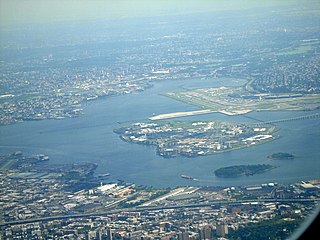Related Research Articles

The Staten Island Ferry is a fare-free passenger ferry route operated by the New York City Department of Transportation. The ferry's single route runs 5.2 miles (8.4 km) through New York Harbor between the New York City boroughs of Manhattan and Staten Island, with ferry boats making the trip in about 25 minutes. The ferry operates 24 hours a day, 7 days a week, with boats leaving every 15 to 20 minutes during peak hours and every 30 minutes at other times. Apart from NYC Ferry's St. George route, it is the only direct mass-transit connection between the two boroughs. Historically, the Staten Island Ferry has charged a relatively low fare compared to other modes of transit in the area; and since 1997, the route has been fare-free. The Staten Island Ferry is one of several ferry systems in the New York City area and is operated separately from systems like NYC Ferry and NY Waterway.

Sing Sing Correctional Facility, formerly Ossining Correctional Facility, is a maximum-security prison operated by the New York State Department of Corrections and Community Supervision in the village of Ossining, New York. It is about 30 miles (48 km) north of Midtown Manhattan on the east bank of the Hudson River. It holds about 1,700 inmates and housed the execution chamber for the State of New York until the abolition of capital punishment in New York in 1977.

Rikers Island is a 413-acre (167.14-hectare) prison island in the East River in the Bronx that contains New York City's largest jail.

A fireboat or fire-float is a specialized watercraft with pumps and nozzles designed for fighting shoreline and shipboard fires. The first fireboats, dating to the late 18th century, were tugboats, retrofitted with firefighting equipment. Older designs derived from tugboats and modern fireboats more closely resembling seafaring ships can both be found in service today. Some departments would give their multi-purpose craft the title of "fireboat" also.

McNeil Island is an island in the northwest United States in south Puget Sound, located southwest of Tacoma, Washington. With a land area of 6.63 square miles (17.2 km2), it lies in an area of many small, inhabited islands including Anderson Island to the south across Balch Passage; Fox Island to the north, across Carr Inlet, and to the west, separated from Key Peninsula by Pitt Passage. The Washington mainland lies to the east, across the south basin of Puget Sound.

Rikers Island Bridge is a girder bridge that connects Rikers Island in the borough of the Bronx with the borough of Queens in New York City. The bridge begins in the Ditmars Steinway area in Astoria, Queens, near the intersection of Hazen Street and 19th Avenue, and continues to the south side of Rikers Island.

The New York City Department of Correction (NYCDOC) is the branch of the municipal government of New York City responsible for the custody, control, and care of New York City's imprisoned population, housing the majority of them on Rikers Island. It employs 8,949 uniformed officers and 2,027 civilian staff, has 543 vehicles, and processes over 100,000 new inmates every year, retaining a population of inmates of between 3,000 and 6,000. Its nickname is New York's Boldest. Its regulations are compiled in title 39 of the New York City Rules.

The Vernon C. Bain Correctional Center was an 800-bed jail barge used to hold inmates for the New York City Department of Corrections. The barge was anchored off the Bronx's southern shore, across from Rikers Island, near Hunts Point. It was built for $161 million at Avondale Shipyard in Louisiana, along the Mississippi River near New Orleans, and brought to New York in 1992 to reduce overcrowding in the island's land-bound buildings for a lower price. Nicknamed "The Boat" by prison staff and inmates, it was designed to handle inmates from medium- to maximum-security in 16 dormitories and 100 cells.
The MV Mary Murray was a 277-foot (84 m) long Staten Island Ferry vessel launched in 1937. She was decommissioned in 1975, and sold at auction with her new owner intending to turn it into a restaurant or museum. She sat tied up at a creek on the Raritan River within view of the New Jersey Turnpike until she was dismantled for scrap in 2008–2012.
Joseph Frederick Merrell was a United States Army soldier and a recipient of the United States military's highest decoration – the Medal of Honor – for his actions in World War II.

Kalief Browder was an African American youth from The Bronx, New York, who was held at the Rikers Island jail complex, without trial, between 2010 and 2013 for allegedly stealing a backpack containing valuables. During his imprisonment, Browder was kept in solitary confinement for 800 days.

The Brooklyn Detention Complex is a jail facility located at 275 Atlantic Avenue, in Brooklyn. It can hold up to 815 male prisoners in its single cells. Most of the population is made up of detainees undergoing the intake process or awaiting trial in Kings or Richmond County.
Anna Moscowitz Kross was a Russian-American lawyer, judge, and public official. She was New York City Commissioner of Correction from 1953 to 1966.
The Correction Officers' Benevolent Association (COBA) is the second largest trade union for law enforcement in New York. COBA is also the largest municipal jail union in the United States. It represents corrections staff within the New York City Department of Correction run by the New York City Department of Correction. It has a membership of 9000.
The Anna M. Kross Center (AMKC), also known as the C-95 is a jail on Riker's Island used to hold male inmates for the New York City Department of Corrections.
The Walter B. Keane (WB), and under the nickname "The Barge", was an 168-bed jail barge used to hold inmates for the New York City Department of Corrections. The barge is currently anchored off Staten Island but was previously docked on Rikers Island, near Hunts Point.

Bethlehem Staten Island also called Bethlehem Mariners Harbor was a large shipyard in Mariners Harbor, Staten Island, New York. The shipyard started building ships for World War II in January 1941 under the Emergency Shipbuilding Program and as the result of the Two-Ocean Navy Act of July 1940. The shipyard was part of the Bethlehem Shipbuilding Corporation which built ships for the United States Navy, and the United States Maritime Commission. Bethlehem Steel purchased the shipyard in June 1938 from United Shipyards. Bethlehem Shipbuilding Corporation closed the shipyard in 1959. The propeller factory and foundry continued operation for 10 more years at the site. Since 1980 the site is the May Ship Repair Contracting Corporation next to Shooters Island at the southern end of Newark Bay, off the North Shore.
George F. McGrath was a United States police commissioner.
New Yorkers have lived on houseboats since the 19th century, docking across several boroughs. Historically, houseboat dwellers were typically men who worked on barges in the Hudson River. Since the 1940s, houseboat inhabitants have mostly chosen to live aboard for pleasure. Boats offer cheap housing, good views, and privacy. In 1999, it was estimated to be several hundred houseboats in the city.
References
- 1 2 3 "Rikers floating dorm scrapped (the Walter Keane)". www.correctionhistory.org.
- ↑ "The Staten Island Ferry". www.siferry.com.
- 1 2 "There Are Fissures of the Heart That Never Mend" (PDF). www.correctionhistory.org. April 5, 2018. Retrieved 2020-11-02.